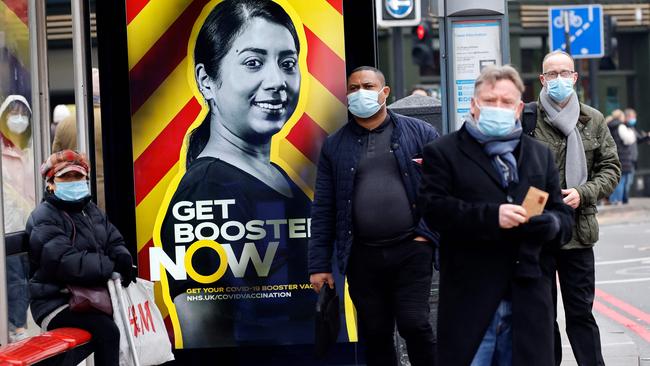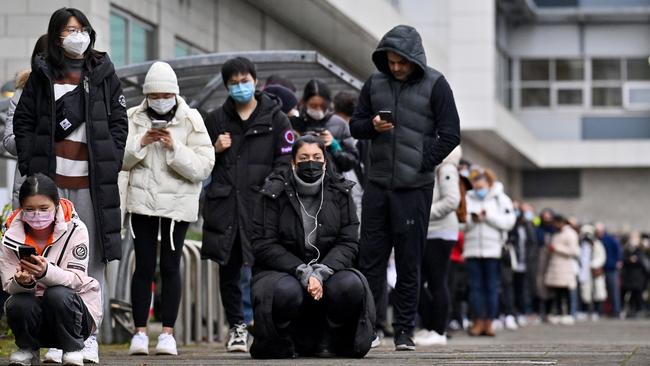James Campbell: Australia watches Europe for hints on how to deal with Omicron
Omicron has quickly become the dominant Covid strain in the UK, giving Australia cause for concern. But there’s also reason to be cautiously optimistic, writes James Campbell.
News
Don't miss out on the headlines from News. Followed categories will be added to My News.
That was quick. Eight days after it was first detected in Britain, data from the UK Health Security Agency showed 54 per cent of new Covid cases were the Omicron variant, making it country’s dominant strain.
It seems poor old Delta, which only yesterday was top of the pops around the world, will soon be consigned to history because the tendency throughout this pandemic has been for one variant to replace another.
The three questions the world has been scrambling to answer for the past few weeks are, in no particular order: How infectious is it? How sick does it make people? How well do our vaccines work against it?
The answer to the first one is, clearly, very infectious indeed — much more than the previous clubhouse leader Delta.
According to UK health authorities, households with Omicron are three times more likely to spread it among members than Delta, which no doubt in part explains why it took only eight days to become the dominant strain, a position Delta took a month to achieve.
The reason would appear to be tied to the discovery by Hong Kong scientists that Omicron reproduces 70 times faster in bronchial tissue than Delta does.
The good news is the same scientists found it spreads 10 times more slowly in the lungs, which would appear to explain the optimism that it doesn’t make people as ill as the Delta variant.
There’s a lot of debate about this at the moment. The first reports out of South Africa were that it caused fewer hospitalisations than Delta, but experts have warned about reading too much into that. South Africa’s population is younger, and more people may have already had the virus and recovered.
As time passes, however, it is looking as though people are less likely to get very sick with Omicron. On just how much less likely, a lot of things are going to hinge in the next few months.

As to the third question — on how well the vaccines work — the answer, sadly, is only so-so, if you have had only two doses, which is why governments around the world are scrambling to get everyone triple-jabbed as quickly as they can.
On Friday, ATAGI signalled where it is going on this front when it issued advice calling for flexibility around the five-month gap between second and third jabs over the holiday season. Indeed, one suspects it might have already moved to cut the gap down to four months if the government wasn’t making it clear it is only just coping with the number of people already eligible.
Sadly, while giving everyone a third jab will help, it won’t get us back to where we were before Omicron. That’s because early indicators are that triple-jabbing against Omicron only gets you back to the same level of protection offered by two jabs of an mRNA vaccine.
Back in the now far-off Delta era the view was that three jabs offered much better protection against infection, as well as serious infection, than two.
Despite this, we are in a good spot for several reasons.
First, despite the slow start to our rollout, we’ve now forced our way towards the top of global vaccination rates and, it stands to reason, if someone has had two jabs, they’re likely to have a third.
The second reason we’re in a good place is actually a result of the fact our vaccine rollout took so long to get going, because it means the protection from our jabs has had less time to wane than for a lot of people in the northern hemisphere.
We’re also in a good place because it’s summer here and the virus is known to spread more quickly in winter.
In one respect, however, we are at a disadvantage to other countries.
According to an Israeli study, people who have been infected with the pre-Delta variants of the virus were 13 times less likely to get Delta than people who had been double-vaxxed but not infected.

Now, it doesn’t necessarily follow that this will apply to Omicron, but if it does, it would suggest it’s going to spread even more widely here than it will in the northern hemisphere because so few people here have been infected and recovered.
Of course as Omicron gets going here that is about to change, which isn’t necessarily a bad thing because if Omicron is indeed less deadly it’s much better the unvaccinated catch that than Delta.
Over the next few weeks health authorities here will be watching closely the hospitalisation and death rates in Europe.
We know case numbers there are going to surge, but if the number of people dying or in hospital doesn’t rise — and these are largely confined to the unvaccinated — then probably nothing much will change here.
But if things go pear-shaped there, you can bet the state and territory authorities here start taking measures to slow the spread.
That might not mean lockdowns — we might just get away with cuts in density limits and more mask wearing — but there will certainly be new restrictions.
Merry Christmas, enjoy your freedoms while they last.
Originally published as James Campbell: Australia watches Europe for hints on how to deal with Omicron



